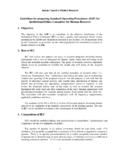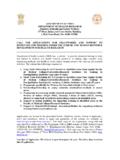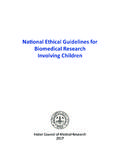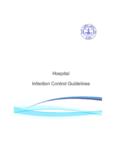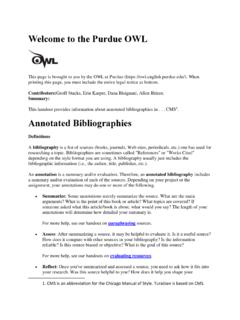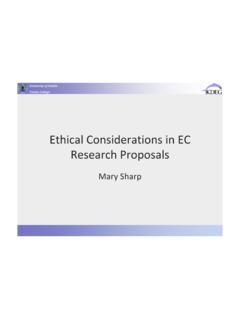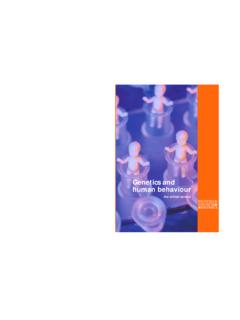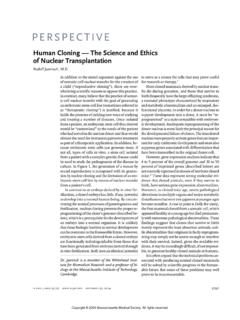Transcription of ON HUMAN PARTICIPANTS - icmr.nic.in
1 ETHICAL GUIDELINESFORBIOMEDICAL RESEARCHONHUMAN PARTICIPANTSINDIAN COUNCIL OF MEDICAL RESEARCHNEW DELHI2006 Published by:Director-GeneralIndian Council of Medical ResearchNew Delhi 110 , 2006 All rights reservedThe use of content from this book is permitted for all non-commercial purposes like education, trainingand dissemination of information, including translation, quotation and reproduction, in any medium,but the content must not be changed and full acknowledgement of the source must be clearly Council of Medical research (ICMR) shall not be held liable for any damages whatsoever as aresult of the use or application of the contents of this document. ICMR, reserves the right to update andchange the contents without notice and accepts no liability for any errors or omissions in this alteration to the original content brought about by display or access through different media andfor any inaccurate advice or information that is provided by sources reached via linkages or referencesto this document is not the responsibility of and layout: Neelam Chaudhury and Nandini K.
2 KumarProduction Controller Mathur, Press Manager, ICMR, New DelhiPrinted at M/s Royal Offset Printers, A-89/1, Naraina Industrial Area, Phase-I, New Delhi-110028 Ph.: 011-25797524 TABLE OF CONTENTSF orewordviPrefaceviiAcknowledgementviiiIn troduction1 Chapter of General Principles on Ethical Considerations2involving HUMAN ParticipantsBackground2 General Statement3 Statement of General Principles4 Chapter Review Procedures8 Basic Responsibilities8 Composition9 Terms of Reference10 Training10 Regulation10 Review procedures11 Submission of application14 Decision making process17 Review Process18 Periodic review18 Continuing review18 Interim review18 Monitoring18 Record keeping19 Administration and management19 Special considerations19 Chapter Ethical Consent for Of of Special Groups as research Information on Confidentiality for29 Prospective
3 research for Accidental Access30 VIII. International Collaboration/Assistance in Bio-Medical/30 Health s Relations with the Media and Publication32 PracticesChapter of Specific Principles for Clinical Evaluation of34 Drugs/Devices/Diagnostics/Vaccines/Herba l RemediesGeneral Principles34 Specific Trials with Surgical Procedures/Medical Agents - Use of Radio - Active Materials49and Evaluation of Traditional Ayurveda, Siddha, Unani50 Remedies and Medicinal PlantsChapter of Specific Principles for Epidemiological Studies56 Introduction56 Definitions57 General Principles58 Specific Principles59 Chapter VI. Statement of Specific Principles for HUMAN Genetics and62 Genomics ResearchIntroduction62 General Trials Including Gene Genome Project (HGP) and Cell-Line Diagnosis75 Chapter VII.
4 Statement of Specific Principles for research in from Live or Cadaver and Foetal for Cosmetic Cell89 Chapter VIII. Statement of Specific Principles for Assisted Reproductive97 TechnologiesIntroduction97 General Principles98 Specific Principles102 Bibliography105 List of Members of Committee (1996-2006)108 FOREWORDThe release of revised Ethical guidelines for Biomedical research on HUMAN subjectsby the Council in 2000 was followed by a number of developments in science andtechnology. These have led to further widening of healthcare between the developedand developing countries. Due to globalization rapid techniques of diagnosis and therapyare now available through R & D. The advances in the area of genetics, genomics andmolecular biology have grown by leaps and bounds with the resultant need to rein inthese advances with sufficient safeguards to protect the rights and welfare of humanparticipants subjected to biomedical research .
5 Globally international agencies have beenbringing out guidelines for researchers in their countries with relevance to developingcountries. WHO and UNESCO are striving to bring a universal consensus to theseguidelines in an attempt to reduce disparity across the the recent advances in the field of Assisted Reproductive Technologies,separate guidelines have been brought out by the Indian Council of Medical Researchas "National Guidelines for Accreditation, Supervision and Regulation of ART Clinicsin India"(2005). Since India is being projected as a global hub for clinical trials and thenumber of corporate hospitals with state-of-the-art facilities is growing, visits by foreignspecialists using newer techniques or devices is increasing.
6 Some Indian institutions arealso involved in making indigenous devices, which have to be tried in Indian patientsfor safety and efficacy. Although a separate document has been made for regulatingthe medical devices under Indian Medical Devices Regulatory Authority (IMDRA)relevant portions have been included in this document. The guidelines for the importantbiotechnology areas like stem cell research and stored tissue including DNA bankinghave also been added in this revision. Taking into consideration the changing dimensionsof ethical issues in the context of new technologies and evolving universal guidelines,the existing chapters on Clinical trials, Organ Transplantation, HUMAN Genetics,Epidemiology and Assisted Reproductive Technologies have also been hope the scientific community, the regulatory agencies and the public at large will beimmensely benefited by this revised DelhiOctober 2006 M.
7 S. Valiathan ChairmanCentral Ethics Committee on HUMAN research ICMR, New DelhiviviiPREFACEIt was proposed in the earlier revised "Ethical Guidelines for Biomedical research onHuman Subjects" of 2000, that the guidelines to each of the areas described would beupdated periodically pari passu with the developments in the area of Biomedical revision has been undertaken in view of the recent development in the area ofScience and technology. Further the points raised in several international and nationalmeetings or workshops on bioethics have been taken into account for making the changeswith relevance to Indian ethos in this third version of ethical guidelines now beingreleased. The Bioethics Cell of the Division of Basic Medical Sciences has over the yearsacquired considerable expertise in addressing ethical queries in relation to advancesmade in biological sciences and biotechnology.
8 This revision will address most of thesein this version. The Statement of General principles remains almost the same as theycontinue to have relevance for future and are template for universal application fordeveloping ethical guidelines in any area relevant to the Indian scenario. All the sevenmajor Chapters, namely, Ethical Review Procedures, General Ethical issues, Clinicalevaluation of drugs/ vaccines / devices/ diagnostics/ herbal remedies, Epidemiologicalstudies, HUMAN genetics and Genomics research , Transplantation research and Assistedreproductive technologies required updating as per the prevalent ethical debates aroundthe globe. Care is taken to include new areas like stem cell research and therapy andbiobanking while elaborating many existing topics to make it more user promised during the release of the ethical guidelines of 2000 about periodic update,the present version is being released.
9 I hope this effort will continue to bring out futurerevisions to keep pace with the global developments in the area of Delhi N. K. GangulyOctober 2006 Director General, ICMRACKNOWLEDGMENTThis is to acknowledge with gratitude the contributions made during the last five yearsby the professionals, public and the media through personal interaction during theinnumerable workshops organized by the Bioethics Cell of the Council in bringing outthese guidelines. We hope that this spirit of togetherness will continue to help us inupdating these guidelines in the coming years to keep pace with further Bioethics Cell of the Council gratefully acknowledges the valuable contribution ofall the members of the panel who reviewed this third version and provided continuedguidance in drafting the new guidelines and finalizing them.
10 Special thanks are due toDr. U. M. Thatte and Dr. Reider Lie for their elaborate patronage of Dr. N. K. Ganguly, the Director General, ICMR for his continuedsupport for preparation of the third version of the Council's Ethical Guidelines isgratefully contribution of Dr. Geeta Jotwani, Dr. Roli Mathur, Dr. Hemalatha Somsekhar, Majumdar, Dr. A. C. Kar, Mr. J. N. Mathur and Ms. Neelam Chaudhary ishighly appreciated for the assistance given for updating these guidelines and bringingout the Delhi Vasantha Muthuswamy,October 2006 Senior Deputy Director General Nandini K. Kumar, Deputy Director GeneralviiiINDIAN COUNCIL OF MEDICAL RESEARCH1 INTRODUCTIONThe Indian Council of Medical research brought out the 'Policy Statement on EthicalConsiderations involved in research on HUMAN Subjects' in 1980 and revised theseguidelines in 2000 as the 'Ethical guidelines for Biomedical research on HumanSubjects'.
